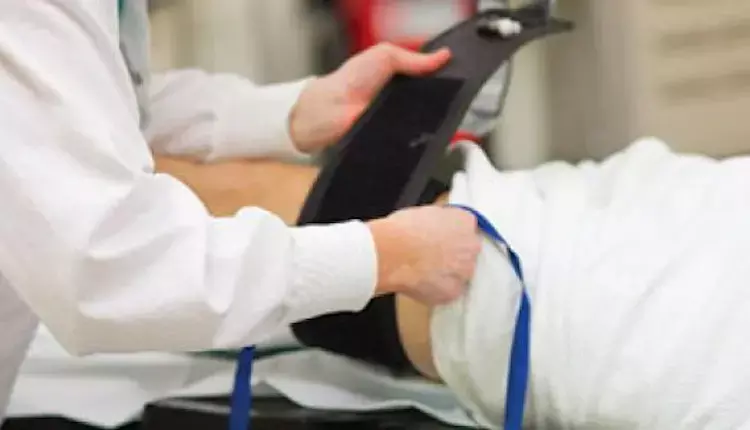- Home
- Medical news & Guidelines
- Anesthesiology
- Cardiology and CTVS
- Critical Care
- Dentistry
- Dermatology
- Diabetes and Endocrinology
- ENT
- Gastroenterology
- Medicine
- Nephrology
- Neurology
- Obstretics-Gynaecology
- Oncology
- Ophthalmology
- Orthopaedics
- Pediatrics-Neonatology
- Psychiatry
- Pulmonology
- Radiology
- Surgery
- Urology
- Laboratory Medicine
- Diet
- Nursing
- Paramedical
- Physiotherapy
- Health news
- Fact Check
- Bone Health Fact Check
- Brain Health Fact Check
- Cancer Related Fact Check
- Child Care Fact Check
- Dental and oral health fact check
- Diabetes and metabolic health fact check
- Diet and Nutrition Fact Check
- Eye and ENT Care Fact Check
- Fitness fact check
- Gut health fact check
- Heart health fact check
- Kidney health fact check
- Medical education fact check
- Men's health fact check
- Respiratory fact check
- Skin and hair care fact check
- Vaccine and Immunization fact check
- Women's health fact check
- AYUSH
- State News
- Andaman and Nicobar Islands
- Andhra Pradesh
- Arunachal Pradesh
- Assam
- Bihar
- Chandigarh
- Chattisgarh
- Dadra and Nagar Haveli
- Daman and Diu
- Delhi
- Goa
- Gujarat
- Haryana
- Himachal Pradesh
- Jammu & Kashmir
- Jharkhand
- Karnataka
- Kerala
- Ladakh
- Lakshadweep
- Madhya Pradesh
- Maharashtra
- Manipur
- Meghalaya
- Mizoram
- Nagaland
- Odisha
- Puducherry
- Punjab
- Rajasthan
- Sikkim
- Tamil Nadu
- Telangana
- Tripura
- Uttar Pradesh
- Uttrakhand
- West Bengal
- Medical Education
- Industry
Tourniquet Use Does Not Impact Trajectory of Total Knee Arthroplasty Early Recovery: study

The impact of tourniquet use on recovery after total knee arthroplasty (TKA) remains controversial. C.M. Lawrie et al conducted a prospective, single blinded, randomized controlled trial to investigate the effect of tourniquet use on early recovery after TKA using a smartphone app based patient engagement platform (PEP) with a wrist-based activity monitor to obtain more robust data on early recovery.
This study has been awarded “Chitranjan S. Ranawat Award” at the 2023 knee society awards. The study has been published in ‘The Journal of Arthroplasty.’
There were 107 patients undergoing primary TKA for osteoarthritis who were enrolled (54 tourniquet [TQ+]; 53 no tourniquet [TQ-]). All patients utilized a PEP and wrist-based activity sensor for 2 weeks preoperatively and 90 days postoperatively to collect Visual Analog Scale (VAS) pain scores and opioid consumption, as well as weekly Oxford Knee Score (OKS) and monthly Forgotten Joint Score (FJS). There was no difference in demographics between groups. Formal physical therapy assessments were performed preoperatively and 3 months postoperatively. Independent sample t-tests were used for continuous data and Chi-square and Fisher’s exact tests were used for discrete data.
Key findings of the study were:
• Tourniquet use did not have a statistically significant impact on daily VAS pain or opioid consumption during the first 30 days postoperatively (P > .05).
• Tourniquet use did not have a significant impact on OKS or FJS at 30 or 90 days postoperatively (P > .05), or on performance of formal physical therapy testing at 3 months postoperatively (P > .05).
• No significant differences were found between groups for any of the physical therapy performed functional assessments preoperatively or at 3 months postoperative.
“In conclusion, we have demonstrated that tourniquet use has no impact on objective functional recovery as assessed by wearable activity monitor during the first 30 days postoperatively. Additionally, we found no clinically significant increased pain or opioid requirement in patients who had a tourniquet used for their procedure. Also, no difference between the tourniquet and tourniquetless groups were found in traditional PROMs measured at 4 and 12 weeks postoperatively and in formal objective physical therapy assessment at 12 weeks postoperatively” – the authors commented.
Further reading:
Tourniquet Use Does Not Impact Trajectory of Total Knee Arthroplasty Early Recovery: A Prospective, Randomized Controlled Trial Charles M. Lawrie, Charles P. Hannon et al The Journal of Arthroplasty 38 (2023) S7-S13 https://doi.org/10.1016/j.arth.2023.03.081
MBBS, Dip. Ortho, DNB ortho, MNAMS
Dr Supreeth D R (MBBS, Dip. Ortho, DNB ortho, MNAMS) is a practicing orthopedician with interest in medical research and publishing articles. He completed MBBS from mysore medical college, dip ortho from Trivandrum medical college and sec. DNB from Manipal Hospital, Bengaluru. He has expirence of 7years in the field of orthopedics. He has presented scientific papers & posters in various state, national and international conferences. His interest in writing articles lead the way to join medical dialogues. He can be contacted at editorial@medicaldialogues.in.
Dr Kamal Kant Kohli-MBBS, DTCD- a chest specialist with more than 30 years of practice and a flair for writing clinical articles, Dr Kamal Kant Kohli joined Medical Dialogues as a Chief Editor of Medical News. Besides writing articles, as an editor, he proofreads and verifies all the medical content published on Medical Dialogues including those coming from journals, studies,medical conferences,guidelines etc. Email: drkohli@medicaldialogues.in. Contact no. 011-43720751


